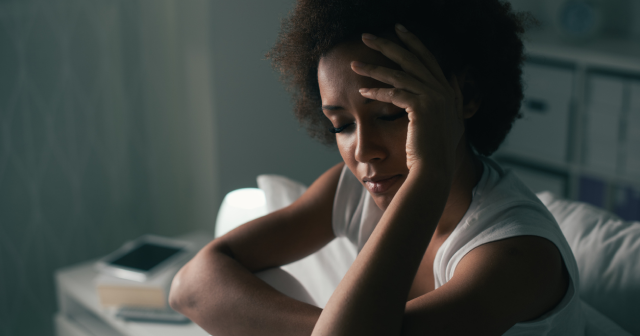Are you having serious trouble sleeping? Do you feel you’re not getting enough sleep every night? Or that the sleep you get isn’t the quality you need to cope with your busy days? Insomnia is a common problem – regularly affecting around 1 in 3 people in the UK – and can be very frustrating, as well as affect your mood and quality of life.
You may have tried everything you can think of to help improve your sleeping – such as going to bed earlier, making your bedroom as comfortable and dark as possible, and avoiding your phone before bedtime – but found these sleep hygiene tips aren’t making a difference.
Everyone deserves to be able to sleep well and not be held back by fatigue. So if you’re considering sleep medication, here’s what you need to know about what your pharmacist can do, and how your doctor can help you work out what’s right for you.
What are sleeping pills?
Sleeping pills are a type of sedative medication. They slow down your body and brain to calm your breathing and heartbeat, and help you feel more relaxed. They’re also known as hypnotics or anxiolytics.
There are 2 main groups of sleeping pills: benzodiazepines and non-benzodiazepines. You’ll usually take them as tablets, but they can also be a liquid that you swallow or that’s injected.
Some you can get from a pharmacist without a prescription, while others need to be prescribed by a doctor if you have, for example, insomnia or anxiety.
Doctors tend to rarely prescribe sleeping pills to treat insomnia because they can have serious side effects and you can become dependent on them if you take them regularly. They’re usually only prescribed for a few days, or 1 week or 2 at the most, if your insomnia is very bad and other treatments haven't worked.
The 3 kinds of sleeping pills you need to know about
1. Pills available from a pharmacist – for short-term sleep problems
If you’re considering trying over-the-counter (OTC) treatments to help you sleep, always make sure you’ve done everything you can with your sleep hygiene first, and that you’ve asked your doctor for sleep advice.
Your pharmacist can talk to you about whether non-benzodiazepines like antihistamines or melatonin might help:
- antihistamines – this medicine is usually used to treat the symptoms of allergies, including hay fever and hives. But some of them also cause drowsiness, which is why they’re used to help treat short-term insomnia (these are known as sedating antihistamines). The most common ones are diphenhydramine and promethazine
- melatonin – a natural hormone produced by your brain, melatonin is known as the ‘sleep hormone’ because it regulates your sleep patterns. Studies suggest taking a melatonin supplement may slightly reduce the time it takes you to fall asleep, but its effects on your sleep quality and total sleep time aren’t clear. However, it may help older people whose bodies aren’t producing enough of this hormone to sleep. In some countries (such as the USA), melatonin supplements can be bought over the counter to treat jet lag and to help you sleep. Melatonin isn’t licensed for OTC use in other countries, including the UK, so you can’t buy it in a pharmacy. But UK doctors can prescribe melatonin for a limited time for older people with insomnia. Read more about how melatonin supplements work.
In some countries including the UK, it’s usually not recommended that you take OTC sleeping pills regularly. This is because they can cause side effects, it’s not known how effective they are specifically for sleep, and they don’t treat the underlying cause of your sleep problem.
How to get the best from pharmacy antihistamines for sleeping
If you talk to your pharmacist and they suggest antihistamines, here are the key things to be aware of:
- antihistamines are slow to act so you might not feel sleepy straight away. They can also leave you feeling like you have a ‘hangover’ effect the following day
- only use antihistamines now and then and for a few nights only to help you sleep. Using them regularly may cause daytime drowsiness and reduce the quality of your sleep in the long term
- diphenhydramine comes in both liquid and tablet form, and often in combination with other medication (like pain relief) in cold and flu medications. For sleep, you'll usually take 50mg 20 minutes before you go to bed, and it takes about 30 minutes to work. It should only be used for sleep problems if you’re older than 16
- promethazine comes in tablet, capsule and liquid form. You'll usually take 20mg to 50mg at night. If you’re pregnant or breastfeeding, promethazine is safe to take and a better option than diphenhydramine. Promethazine can be taken safely by most adults, but children under 6 shouldn’t be given it if it’s been bought at a pharmacy – it should only be prescribed by a doctor
Side effects of antihistamine sleeping aids, and when not to use them
Some side effects of both diphenhydramine and promethazine include:
Make sure you let your pharmacist know if you have any underlying conditions, and if you’re taking any other medication – taking antihistamines with certain medicines could stop either from working properly or cause side effects.
Your pharmacist may tell you not to take antihistamines if you’ve had an allergic reaction to them before or you have certain conditions, including:
- an enlarged prostate gland
- problems peeing (urinary retention)
- glaucoma (increased pressure in your eyes)
- liver disease
- epilepsy
2. Prescribed benzodiazepines for sleep problems
Benzodiazepines work by boosting the effect of a natural chemical in your brain called GABA (gamma aminobutyric acid). This has a calming effect on your muscles and brain, helping you relax and drop off to sleep.
These sleeping pills include:
- diazepam
- nitrazepam
- temazepam
Benzodiazepines are available on prescription only from a doctor as they can cause serious side effects, which is why they can only be used for a short time and only if absolutely necessary.
3. Prescribed Z-drugs – for serious sleep problems
If you have severe insomnia and non-medication treatments like sleep hygiene measures haven't helped, a doctor may prescribe a short course of one of the ‘Z drugs’. They’re called the ‘Z drugs’ because their names begin with the letter ‘z', including zopiclone and zolpidem.
These non-benzodiazepine sleeping pills have the same calming effect on your brain as benzodiazepines do. They’re short-acting drugs, so their effects (including their negative effects) don’t last as long as other types of sleep medication do.
Read more about how Z drugs and benzodiazepines can cause serious side effects and other problems, including your body becoming dependent on them and withdrawal symptoms.
When to see a doctor about a lack of sleep
See your doctor if:
- changing your sleeping habits hasn’t worked
- you’ve had trouble sleeping for more than 4 weeks
- insomnia is seriously affecting your daily life or causing you a lot of distress
- you have an underlying condition and you think it’s affecting your sleep
- you think you might have a sleep disorder such as insomnia, restless leg syndrome or sleep apnoea
If you’re not sure whether you need to see a doctor, try the Healthily Smart Symptom Checker to work out what your next step should be.
How will your doctor decide if sleeping pills will help you?
Before prescribing any sleeping pills, your doctor will try to find out what's causing your sleeping problem so you can get the right treatment. They will ask about:
- your symptoms
- your medical history and if you have any underlying conditions
- your lifestyle habits, such as how much caffeine and alcohol you drink
If your doctor thinks you may have a sleep disorder, there are many ways they may try to diagnose this, including:
- asking you to keep a sleep diary – you’ll need to record your daily sleep patterns for 1 to 2 weeks, including when you go to bed and wake up, when you nap, when and how much caffeine and alcohol you drink. This helps your doctor identify patterns or behaviours that affect your sleeping, including anxiety and depression. To track your sleep patterns and habits for your sleep diary, consider using Healthily's app, which has a sleep tracker and a journal
- referring you to a specialist for further investigations such as a sleep study – this can be helpful if your doctor thinks your sleep problem is caused by sleep apnoea, narcolepsy or other sleep disorders. In these overnight studies, your breathing, heart rate and brain activity will be monitored while you sleep. Your sleep quality and how quickly you fall asleep may be measured, too
You may be prescribed a short course of a sleeping tablet if:
- sleep hygiene measures haven't improved your sleep quality
- your lack of sleep is causing you a lot of distress
- you’ve had insomnia for less than 3 months (known as short-term insomnia)
If you’re older or are pregnant or breastfeeding, your doctor won’t prescribe you Z drugs or benzodiazepines. However, if you’re over age 55 and have short-term insomnia, you can be prescribed melatonin.
- If your insomnia has lasted for more than 3 months (long-term, or chronic, insomnia), your doctor may refer you to a therapist for cognitive behavioural therapy for insomnia (CBT-I). This helps you change the thoughts and behaviours that keep you from sleeping.

How to get the best from sleeping tablets your doctor prescribes
You’ll usually only be given a sleeping tablet prescription for a very short period – usually up to 1 week only. And if 1 type of sleeping tablet doesn’t work for you, your doctor is unlikely to prescribe another.
Follow these safety tips:
- always take them according to your doctor’s instructions and the medication’s information leaflet
- don’t drink alcohol while taking them – if you do, you may get side effects like dizziness, fainting and even slowed breathing. Plus, alcohol can cause insomnia
- never share your sleeping tablets with anyone, and keep them in a safe place such as a locked cupboard
- only take your sleeping pill at bedtime – sleeping pills make you drowsy and can increase your risk of having or causing an accident, so finish any activities you need to do before taking your pill
- don’t take your sleeping tablet unless you can get a full night's sleep of at least 7 hours
- don’t drive or operate machinery if you feel drowsy the next day
- when you need to stop taking them, follow your doctor’s directions or those on the medication’s information leaflet. Some may need to be stopped gradually, for example. Be aware you may find it hard to sleep for a few nights after stopping them as your body adjusts – this is known as ‘short-term rebound insomnia’
- these pills shouldn’t be added to your repeat prescription
- if you’re taking melatonin, don’t drink alcohol or smoke – these stop it working as well as it should. You may get a headache after taking melatonin, or feel sick, tired and irritable the following day
Prescribed sleeping pill side effects and other concerns your doctor may have
Prescribed sleeping pills can cause serious side effects and problems, including:
- drowsiness and clumsiness – this includes a greater risk of falls and injury for older people
- mood changes such as confusion, forgetfulness, aggression and depression
- getting used to their effects and becoming dependent on them (both physically and psychologically), or addicted to them, which can make it difficult to stop taking them – your body can get used to their effects after only taking them for a week
- having withdrawal symptoms when you stop taking them – this can include anxiety, panic attacks, sweating, headaches and shaking. If you’ve been taking a Z drug or a benzodiazepine for more than 2 to 4 weeks, you’ll need to gradually come off them to prevent serious withdrawal symptoms
You usually won’t be prescribed Z drugs if you have the following conditions:
- severe lung disease or breathing problems
- sleep apnoea
- severe liver disease or kidney disease
- severe and uncontrolled myasthenia gravis (a neuromuscular condition)
Your doctor will also be cautious about giving you sleeping pills if you have:
- a history of drug or alcohol misuse
- a personality disorder diagnosis
- chest and lung problems
- neuromuscular weakness, including myasthenia gravis
Your health questions answered
Can I take someone else’s sleeping tablets?
Answered by: Dr Roger Henderson
“No, you mustn’t take someone else’s sleeping tablets, as they’ve been prescribed specifically for their health needs, not yours. Benzodiazepines and Z drugs can also sometimes be misused by people taking drugs for recreational purposes. The Misuse of Drugs Act was a law passed in 1971 in the UK to try to prevent the use of harmful drugs. This law divides drugs into three categories: A, B or C, depending on how dangerous they’re thought to be. Benzodiazepines and Z drugs are classed as Class C drugs, which means it's illegal to be in possession of them if they haven’t been prescribed for you by a doctor. If they’re illegally in your possession, or you’re attempting to supply them to other people, you could face a fine or a prison sentence.”
How can I stop taking sleeping tablets?
Answered by: Dr Roger Henderson
“If you’ve been taking sleeping tablets for some time and want to stop them, it’s best to consult a doctor or nurse for advice, as they can be difficult to stop and you may, for example, get withdrawal symptoms. General advice includes:
cutting your dose down a little at a time
waiting until your stress levels are low (such as when you’re on holiday, for example)
being aware that you’re likely to have a period of poor sleep for a short time after stopping the pills”







